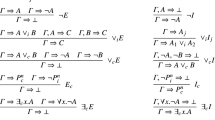Abstract
This paper treats entailment as a subrelation of classical consequence and deducibility. Working with a Gentzen set-sequent system, we define an entailment as a substitution instance of a valid sequent all of whose premisses and conclusions are necessary for its classical validity. We also define a sequent Proof as one in which there are no applications of cut or dilution. The main result is that the entailments are exactly the Provable sequents. There are several important corollaries. Every unsatisfiable set is Provably inconsistent. Every logical consequence of a satisfiable set is Provable therefrom. Thus our system is adequate for ordinary mathematical practice. Moreover, transitivity of Proof fails upon accumulation of Proofs only when the newly combined premisses are inconsistent anyway, or the conclusion is a logical truth. In either case Proofs that show this can be effectively determined from the Proofs given. Thus transitivity fails where it least matters — arguably, where it ought to fail! We show also that entailments hold by virtue of logical form insufficient either to render the premisses inconsistent or to render the conclusion logically true. The Lewis paradoxes are not Provable. Our system is distinct from Anderson and Belnap's system of first degree entailments, and Johansson's minimal logic. Although the Curry set paradox is still Provable within naive set theory, our system offers the prospect of a more sensitive paraconsistent reconstruction of mathematics. It may also find applications within the logic of knowledge and belief.
Similar content being viewed by others
References
N. Tennant,A proof-theoretic approach to entailment,Journal of Philosophical Logic 9 (1980), pp. 185–209.
N. Tennant,Natural Logic, Edinburgh University Press, 1978.
N. Tennant,Proof and paradox,Dialectica 36 (1982) pp. 265–295.
T. J. Smiley,Entailment and deducibility,Proceedings of the Aristotelian Society n. s. 59 (1968–9), pp. 233–254.
A. R. Anderson andN. D. Belnap,First degree entailments,Mathematische Annalen 149 (1963), pp. 302–319.
I. Johansson,Der Minimalkalkül, ein reduzierter intuitionistischer Formalismus,Compositio Mathematica 4 (1936), pp. 119–136.
R. K. Meyer, R. Routley andJ. M. Dunn,Curry's paradox,Analysis 40 (1980), pp. 124–128.
Author information
Authors and Affiliations
Rights and permissions
About this article
Cite this article
Tennant, N. Perfect validity, entailment and paraconsistency. Stud Logica 43, 181–200 (1984). https://doi.org/10.1007/BF00935749
Received:
Revised:
Issue Date:
DOI: https://doi.org/10.1007/BF00935749



